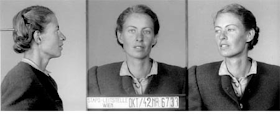 |
| Ella Reiner (1908-2002) |
The autobiographical account
can be read and searched online. We refer to it by the abbreviation POF. In 1960 she was a witness in the Auschwitz trials, and her testimony (
here, pages 28-38) contains many interesting elements.
We start our biographical sketch by comparing two registration forms (called
Nationale, to be viewed
here) of the University of Vienna.

The first form, for the first semester of the academic year 1937/38, concerns medical student ELLA REINER, born in Vienna November 18, 1908, of Yugoslavian nationality, residing in Ernestinovo (Croatia), mother tongues Croatian and German. On the second form,
first semester of the following year, she appears as ELLA LINGENS, of German
nationality, residing in Vienna, mother tongue German. Her
marriage to fellow student Kurt Lingens had made her German. As this was her seventh semester, the academic year 1938/39 was the 4th year of her medical studies. Counting backwards, we find that she must have started medicine in the academic year 1935/36. She had already graduated in Law, in 1931. It is said that her foreign nationality made an appointment impossible, and that this is what made her turn to medicine. It's a little bit strange that a law student would not have been aware of this from the very beginning. Anyhow this impediment would disappear, because by 1939 she had become German and Austria also had.

Reiner's husband Kurt Lingens was a German national who had had to study abroad because of his left-wing political involvement at home. His registration forms (
here) show that he and Ella were students in the same class. He was acknowledged as a physician on June 19, 1942, and became doctor of Medicine on May 14, 1943 (
here). [Aside. Both for Kurt and Ella, the 1937/38 form says
Presently in the 4th semester, which for Kurt was changed in pencil to
6th.]
On August 8, 1939, a son, Peter Michael, is born to the Lingens-Reiner family. In her account (
here) Ella says that she had finished her medical studies shortly before she was arrested (October 13, 1942) but so had not done any practical work yet. On the website of the University of Vienna (
here) it is said that she graduated after the war, and her 1960 testimony provides some details: to avoid conscription, she deliberately did not take the 15th (and last) of her exams, but only did so in 1946.
On her return from the concentration camps, Ella Reiner found that her husband had left her, and they divorced in 1947. She continued to use her husband's name for the rest of her life though, calling herself
Ella Lingens-Reiner or even
Ella Lingens. She died in 2002. In the New Yorker's
Letter from Europe from June 20, 1986 (
here, p.17) it is claimed she had been a member of the
National Socialist Working Women.
It is not clear what association is meant (Deutsches Frauenwerk?
NS-Frauenschaft?) and moreover, before being arrested Ella was a mother and a student but by
no means a 'working woman'.
*
In the records of the Viennese Gestapo (look it up
here by
Opfersuche i.e. Search of Victims) the arrest of Lingens and Reiner on Otober 13, 1942 is registered as follows:
"Dr. Ella Lingens is accused of having financially supported and having helped in their illegal attempt to leave the country the Polish Jews [names] who, strongly suspected to belong to the Polish resistance movement, had already been arrested on September 4, 1942. Besides that, it was established that she had received from Poland, through a person as yet unknown, precious jewelry to be used to finance the leaving of the Jews.
Her husband is accused of having participated in the plot of his wife and moreover to have informed on what grounds [name of a German] had been imprisoned in military custody, letting the informer know through [name, one of the Jews mentioned] that he would pay whatever price for the information."
In
POF (p.2) Ella Reiner adds
The man who was supposed to help them was himself a Jew. But he was a spy, a Jewish Gestapo spy: he had allowed one person to escape so that he might catch others with greater certainty. He led our friends straight into the hands of the Gestapo.
Her fate is treated in a separate post (
here). Kurt Lingens fared very differently from his wife. In a letter dated March 1947 (reproduced
here) he summarizes his own fate in a rather confusing way.
In 1942, when I was Unterarzt (doctor-officer aspirant) in the Wehrmacht, I was arrested for patronizing Jews and the enemy. After being demoted, I was sent to the front by way of punishment, in spite of physical incapacity. [In the police photos of his arrest, Lingens is seen to have a right eye not functioning.] As of autumn 1944 I was active in the resistance group of my then unit, in connection with the civil resistance group Peters. (...)
After my first arrest (end of January 1943), when I was trying to escape a looming second arrest, Dr. M [the subject of the letter] helped me in a most unselfish way. (...) After my second arrest he visited me in my cell in the viennese Radetzky-barracks, in his military uniform (...). When, after my demotion and enforced front service, I served in the sick bay of the Radetzky-barracks, Dr. M. was most valuable in fencing off front services [for other people].
There seems to be some confusion as to the first arrest (1942 or January 1943). The punishment (after the second arrest?) appears to have consisted of demotion and a limited period of front service, after which he resumed his normal service as a doctor in a military hospital in Vienna.
*





